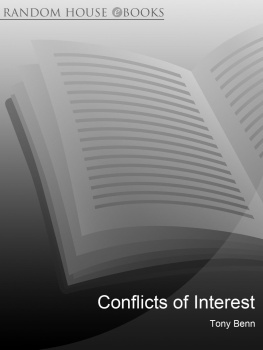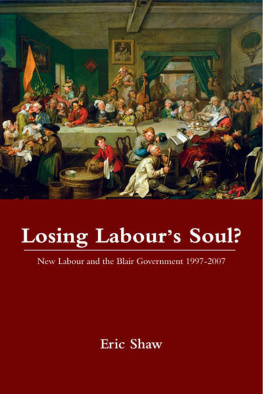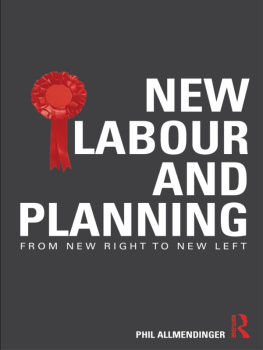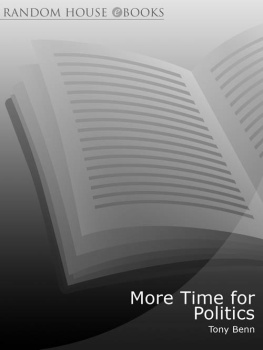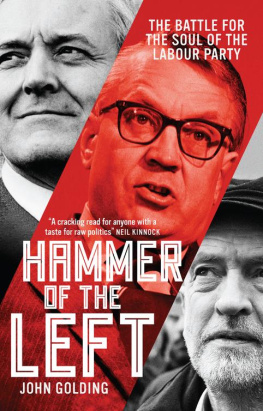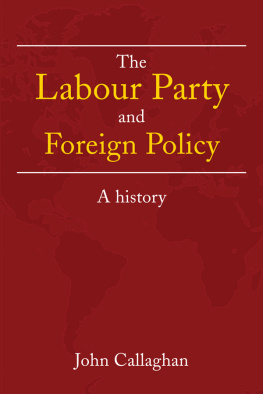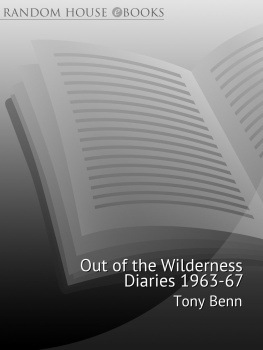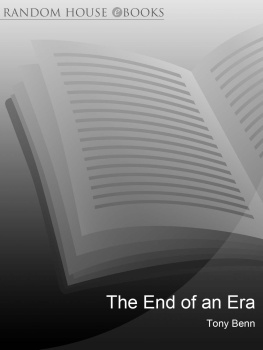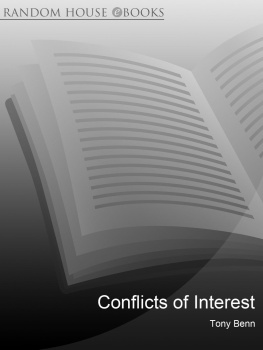Contents
Also in Arrow by Tony Benn
OUT OF THE WILDERNESS: Diaries 196367
OFFICE WITHOUT POWER: Diaries 196872
AGAINST THE TIDE: Diaries 197377
Notes
Chapter One
. (p. 7) Militant was a Trotskyist movement within the Labour Party, particularly strong among the Young Socialists. One of its supporters, Andy Bevan, was appointed National Youth Officer of the Labour Party in 1976 but his position was a continual source of controversy and there were numerous attempts to remove him from the post and to discredit Militants activities. This hostility to the movement culminated in the wave of expulsions of Militant sympathisers from the Labour Party in the 1980s.
. (p. 11) The Bullock Report was the outcome of a committee of inquiry set up under Harold Wilson in August 1975 to consider how best to extend employee control over management within individual companies. The Government Committee on Industrial Democracy was headed by Sir Alan Bullock and reported in January 1977.
The committee accepted that workers representation could only be achieved through established trade union structures, and their main recommendation was that, in companies employing more than 2000 people, employees could choose to adopt a scheme involving equal representation of employees and shareholders on a unitary company board. The reaction from employers was predictably hostile, and some industrialists who had actually sat on the committee issued a minority report opting instead for a two-tier board with representation for workers on a supervisory board which could influence management but would be kept separate from it. They particularly opposed a trade union channel of representation and favoured the West German system of works councils separate from the trade union negotiating machinery. The recommendations of the Bullock Report were never implemented.
Members of the committee were: Sir Alan Bullock, Professor George S. Bain, Norman P. Biggs, Sir Jack Callard, Barrie Heath, Clive Jenkins, Jack Jones, David Lea, John Methven, Professor K. W. Wedderburn, Nicholas S. Wilson. Biggs, Callard and Heath were signatories of the minority report. Nicholas Wilson signed the majority report but submitted a note of dissent.
. (p. 18) Mark Hosenball and Philip Agee were two Americans working in Britain, eventually deported by the Home Secretary. Hosenball was a journalist and had published articles giving the location and functions of British Intelligence communication centres. Agee was a former CIA operations officer who wrote a book exposing CIA activities. Their deportation threat aroused much protest from civil liberties groups, the NUJ and the TUC because of the insubstantial nature of the allegations against them and the issues of freedom of speech raised.
.(p. 29) In 1977 Windscale, renamed Sellafield in the 1980s, housed BNFLs Calder Hall nuclear reactor for producing plutonium for nuclear weapons use and for generating electricity. It also had facilities for reprocessing spent nuclear fuel from other reactors to recover residual uranium and plutonium for re-use as well as other radioactive wastes for safe storage. The complex additionally housed research laboratories run separately by the AEA.
A thermal oxide reprocessing plant (Thorp) was also planned for Windscale, and in early 1977 BNFL was waiting for approval of the planning application from a Department of Environment planning inquiry, that Department, under Peter Shore, having assumed general responsibility for the disposal of nuclear waste in 1976. Thorp was specially designed for reprocessing oxide fuels which were more highly radioactive. In addition to handling spent fuel from British nuclear reactors, Thorp was contracted to reprocess 3000 tons from Japan.
Objectors argued that oxide fuel reprocessing was technically unproven. Moreover, Britains claim that it must recover plutonium for civil uses could legitimate other countries production of plutonium and lead to the proliferation of nuclear weapons.
The application was eventually approved and building went ahead.
Chapter Two
.(p. 98) Jet (Joint European Torus) was a European Community project to develop nuclear energy for western Europe through thermonuclear fusion. Although the research was done at Culham, near Oxford, the European Council could not decide where the reactor should be sited and this continually held up progress. The UK, France and West Germany all wanted it. The project was eventually sited at Culham.
.(p. 145) The Daily Mail of 19 May 1977 published a letter from Lord Ryder, Chairman of the National Enterprise Board, to British Leylands Chief Executive, Alex Park, referring to a special account for securing contracts in the Middle East. The letter, dated October 1976, mentioned Eric Varley, Secretary of State for Industry.
The NEB denied that any such letter had been sent, and two days later the Daily Mail announced that a financial analyst with British Leyland, Graham Barton, had admitted forging the letter. An unreserved apology to Ryder, Park and Varley was published. Barton was subsequently charged with forgery.
whereupon the company sacked 137 people involved. The strike thus became a dispute about union recognition, the company refusing to accept the workers rights, and went on for over a year. It attracted enormous support and mass picketing from other unions and Labour MPs, and the attention of the right-wing National Association for Freedom, which backed the company.
Despite the support and the basic principle being fought under a Labour Government, the strike was a failure. The employer refused to co-operate with ACAS under the 1974 Trade Union and Labour Relations Act and nothing could be done under existing legislation to force the company to accept the workers rights.
. (p. 184) The white Government in Rhodesia declared independence (UDI) from Britain in 1965. Since then guerrilla warfare had been escalating. By the end of 1976 the Rhodesian Prime Minister Ian Smith had accepted black majority rule in principle but no settlement had been agreed with the leaders of the black nationalist movements notably Robert Mugabe of ZANU and Joshua Nkomo of ZAPU. Together they had formed the Patriotic Front, which was committed to maintaining the guerrilla war until a real transfer of power from whites to blacks had been carried out.
After UDI, the British Labour Government had instituted a number of sanctions against the Smith regime. Included was the prohibition of oil exports, but this was repeatedly violated by subsidiaries of British oil companies operating through South Africa and Mozambique. In May 1977 the Bingham Inquiry was set up to look into sanctions busting, and a report published in 1978 was highly critical of the oil companies concerned ().
Chapter Three
.(p. 284) General Sir Frank Kitson, who had fought against the Mau Mau in Kenya, devised methods of terrorising terrorists which are described in his books Gangs and Counter-Gangs and Low-Intensity Operations. During his stay with the British army in Northern Ireland in 19702, he developed an effective system of undercover operations including intelligence gathering, penetration of the IRA and use of black propaganda against terrorist organisations. Many believed that Northern Ireland was being used as a testing ground for counter-terror and also counter-insurgency techniques that would subsequently be employed in Great Britain and elsewhere.
.(p. 325) In 1969 a Czech Intelligence officer, Josef Frolik, defected to the USA, and gave names to the CIA of British Labour politicians suspected of espionage activity, or communist sympathies. Amongst these was John Stonehouse, allegedly the victim of a sexual trap in Czechoslovakia. MI5 was informed and Harold Wilson was given the information. Stonehouse, then Postmaster-General, was questioned by MI5 but Wilson was sceptical of the claim and Stonehouse remained in the Government until the defeat in 1970. David Leigh, in his book
Next page
